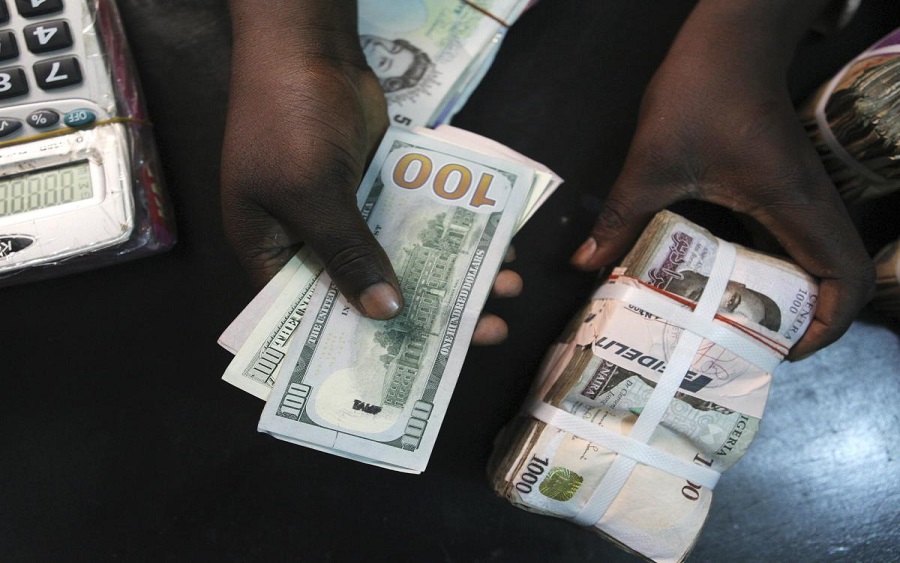Thursday, 25th November 2021: The exchange rate between the naira and the US dollar closed at N415.07/$1, at the officially Investors and Exporters (I&E) window. Naira closed flat against the US dollar on Thursday at N415.07/$1, the same as recorded in the previous trading session. This is despite a 59.7% decline in forex turnover at the official window from $243.34 million recorded on Wednesday to $98.07 million.
Similarly, naira remained flat at the parallel market, as it closed at N560/$1 on Thursday the rate that was recorded in the previous trading session. This is according to information obtained from BDC operators interviewed by Nairametrics.
Nigeria’s foreign reserve dropped yet again by 0.06% on Wednesday, 24th November to close at $41.33 billion compared to $41.35 billion recorded as of the previous day. The recent decline in the nation’s external reserve is attributed to the intervention by the apex bank in the official forex market.
Trading at the official NAFEX window
The exchange rate at the Investors and Exporters window closed flat on Thursday at N415.07/$1, the same as recorded in the previous trading session. Meanwhile, it had depreciated in the previous session from N414.8 to a dollar recorded on Tuesday to close at N415.07/$1.
The opening indicative rate closed at N413.58/$1 on Thursday, which represents a 24 kobo gain compared to N413.82/$1 recorded in the previous trading session.
An exchange rate of N452.56 to a dollar was the highest rate recorded during intra-day trading before it settled at N415.07/$1, while it sold for as low as N406/$1 during intra-day trading.
Forex turnover at the official window decreased by 59.7% to $98.07 million on Thursday.
According to data tracked by Nairametrics from FMDQ, forex turnover at the I&E window dropped from $243.34 million recorded on Wednesday 24th November 2021 to $98.07 million on Thursday 25th November 2021.
Cryptocurrency watch
The crypto market started the day on a bearish note despite positive gains recorded in the previous trading session. On Thursday, 25th November, the industry market capitalization gained 3.76% to close at $2.624 trillion. As of the early hours of Friday, the market capitalization had dipped by 2.08% to stand at $2.579 trillion.
Bitcoin also started on the reds with a decline of 2.27% to stand at $57,645.71. The flagship crypto-asset had gained 2.71% on Thursday to close at $58,731.93. In the same vein, Ethereum dipped 2.49% to stand at $4,413.
Crude oil price
Bearish sentiments are beginning to dominate the global crude oil market as Brent Crude dipped 2.51% in the early hours of Friday to trade at $80.16 per barrel, while West Texas Intermediate had already lost over 300 basis points as of the same time to trade at $75.9 per barrel.
On the other hand, Natural gas gained by 1.62% to trade at $5.15, while heating oil dipped by 2.87% to trade at $2.315. Opec basket gained 3.61% to trade at $81.75, while Nigeria’s crude, Bonny Light dipped 0.88% to trade at $80.74 per barrel.
The US announced on Tuesday that it would be releasing 50 million barrels of oil from its strategic reserve, in a bid to drive the surging price of gasoline down. The market has begun to react bearishly despite its resolve on the day of the announcement.
Meanwhile, the crude oil market now turns to the OPEC+ meeting for next week to see if the cartel will continue with its planned 400,000 supply increase into the market or react based on Joe Biden’s crude oil release.
External reserve
Nigeria’s foreign reserve declined by $24.29 million on Wednesday, 24th November to close at $41.33 billion, representing a 0.06% decline compared to $41.35 billion recorded as of the end of the previous day. The decline is attributed to the continuous intervention of the apex bank in ensuring the stability of the exchange rate.
A move, which saw the rate at the parallel market drop from N575/$1 to about N546/$1. However, the naira has depreciated to N560/$1 at the black market.
The nation’s foreign reserve had gained $5.99 billion in the month of October, as a result of the $4 billion raised by the federal government from the issuance of Eurobond in the international debt market.
The gains recorded in the previous month is higher than the $2.76 billion gain recorded in the month of September 2021. Meanwhile, Nigeria’s reserve has now recorded a decline of $494.62 million so far in the month of November, while on a year-to-date basis, the reserves have gained $5.95 billion.

















